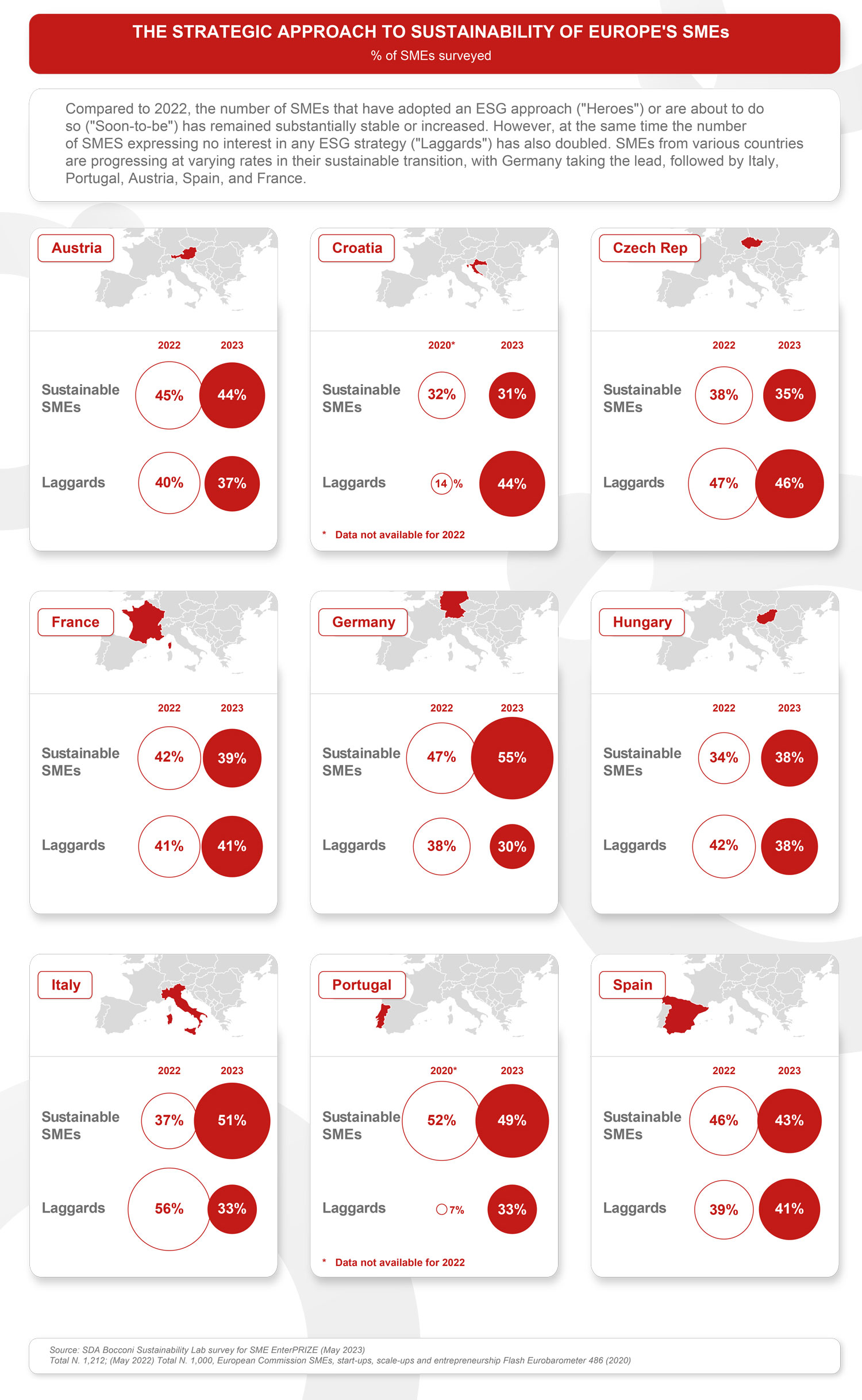Generali & SDA Bocconi Research: SMEs seek more public support to improve sustainability

NextGenerationEU funds have boosted more than half of the most sustainable businesses – which have proved to be more resilient to external shocks. However, as energy prices, inflation and war in Ukraine hinder efforts, SMEs ask policymakers for tax incentives, EU funds, and education initiatives to make their businesses more sustainable
Europe’s small and medium-sized enterprises are seeking a boost from policymakers in order to make their businesses more sustainable, according to research carried out by SDA Bocconi School of Management in partnership with Generali for the SME EnterPRIZE project, with the first findings anticipated on the UN’s Micro, Small, and Medium-Sized Enterprise Day falling on 27 June.
According to the survey, SMEs urged policymakers to offer tax incentives to promote sustainable products and services (73%, of all SMEs surveyed), subsidized funds from the European Union to finance the green transition (67%) and an advance for education and capacity building (63%).
The research, which was carried out by SDA Bocconi’s Sustainability Lab, reached the owners and managers of over 1,200 SMEs from 9 European countries.
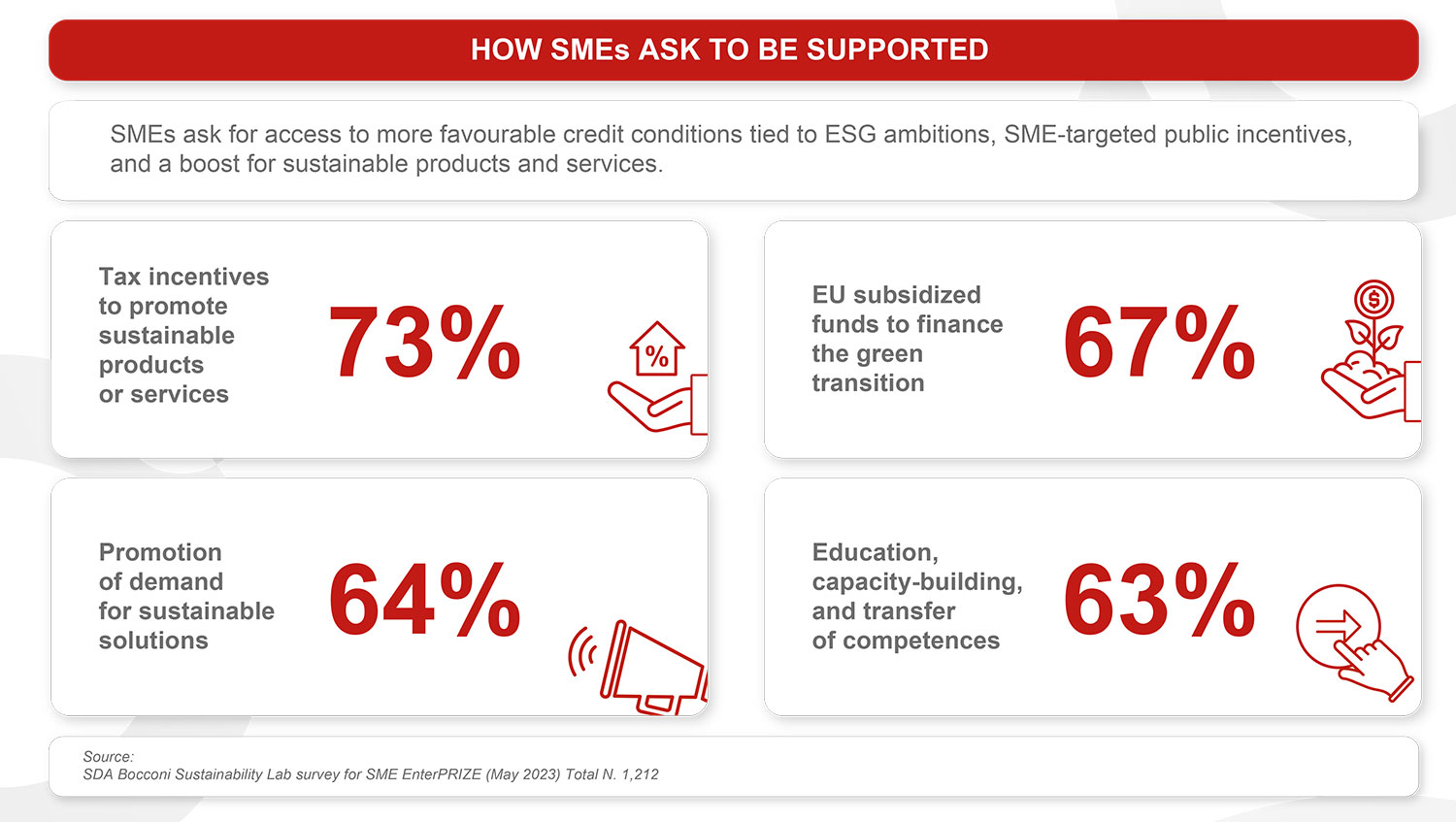
Barriers to adopting sustainable business practices have increased
59 percent of SMEs surveyed identified energy price rises as negatively impacting their approach towards sustainability, while 58 percent cited inflation.
The percentage of European SMEs perceiving significant barriers as holding back their sustainable transition has also risen across a number of key areas. Over 50 percent of SMEs indicated that impact from a lack of institutional support from regulation and bureaucracy hindered their efforts, doubling compared to 2022. 49 percent of SMEs cited a lack of public incentives, up from 28 percent last year. SMEs also identified a lack of a clear legislative framework, and missing internal skills and competencies, as barriers, which have increased year-on-year.
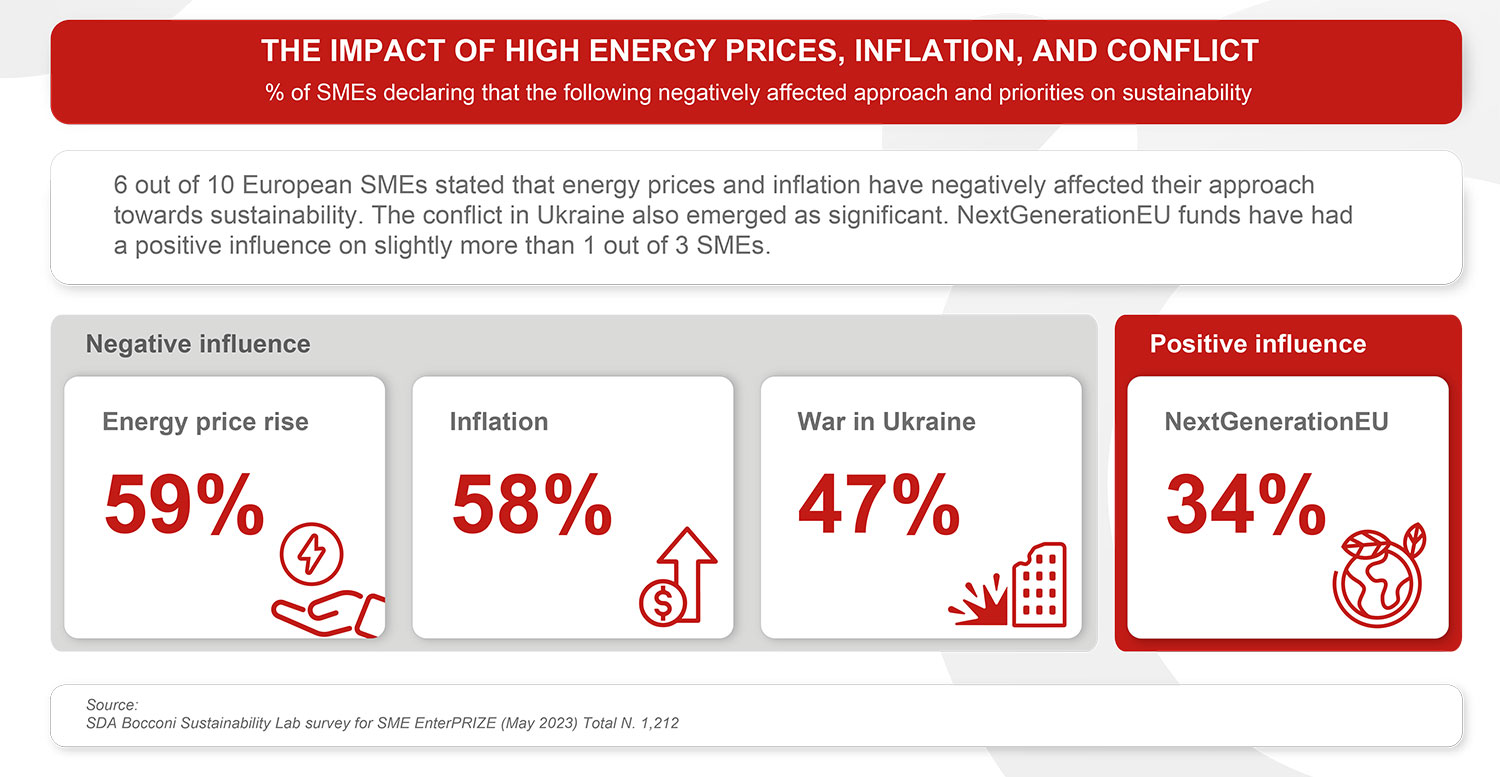
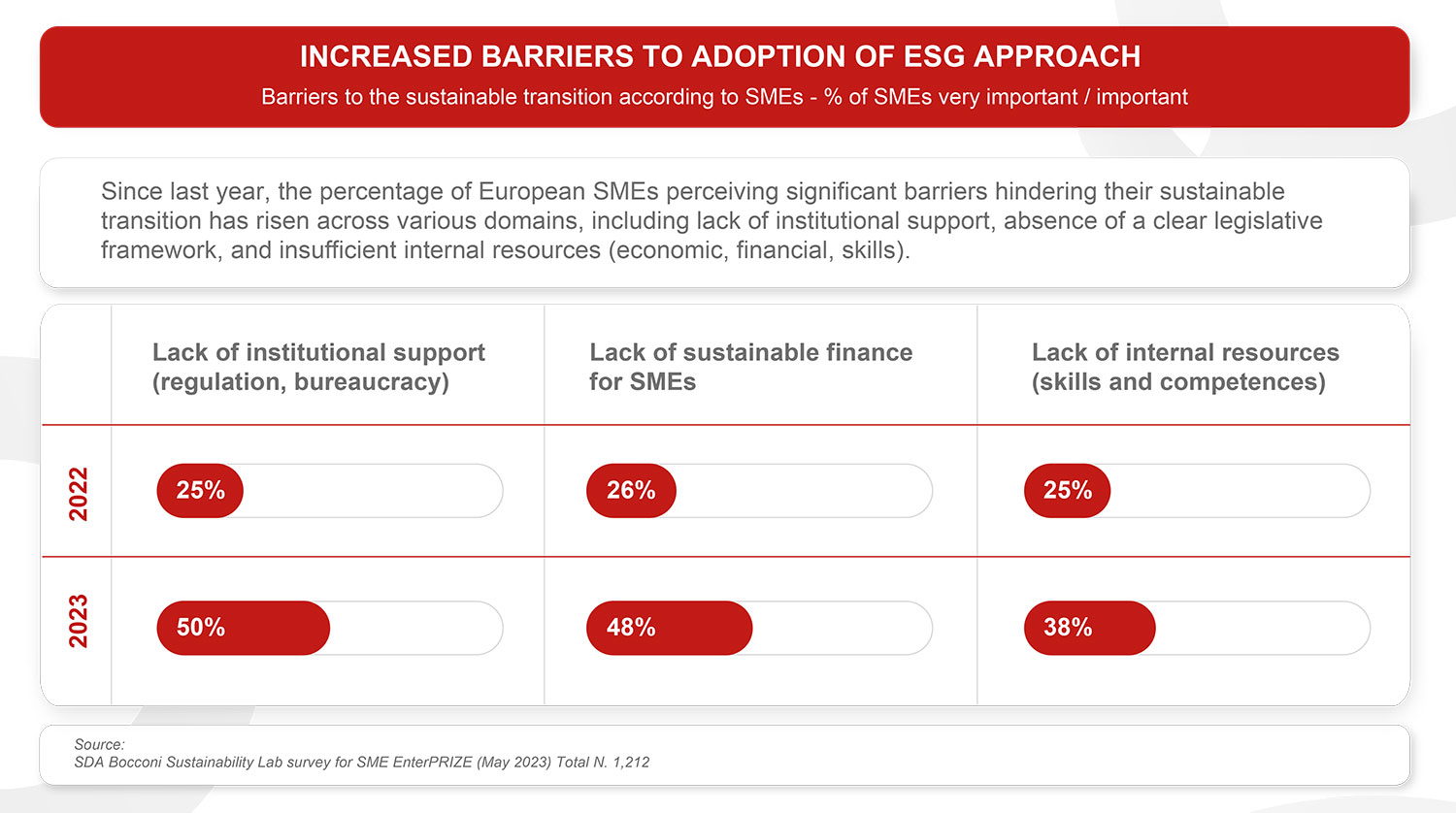
Sustainable SMEs are more resilient to external shocks
The survey also found that 52 percent of businesses which have already implemented a sustainability plan said they felt a positive impact from the NextGenerationEU funds, compared to only 20 percent of those with no plan. Businesses with the most-developed sustainability plans – i.e., including employee welfare initiatives, community engagement, and environmental-related actions such as circular economy, energy efficiency, and decarbonization – have also proved more resilient to external shocks, such as inflation, energy price rises or the war in Ukraine. There was also a clear indication that companies with a sustainability focus benefited from a better environmental impact (82%), increased customer satisfaction (75%) and an enhanced reputation (64%).
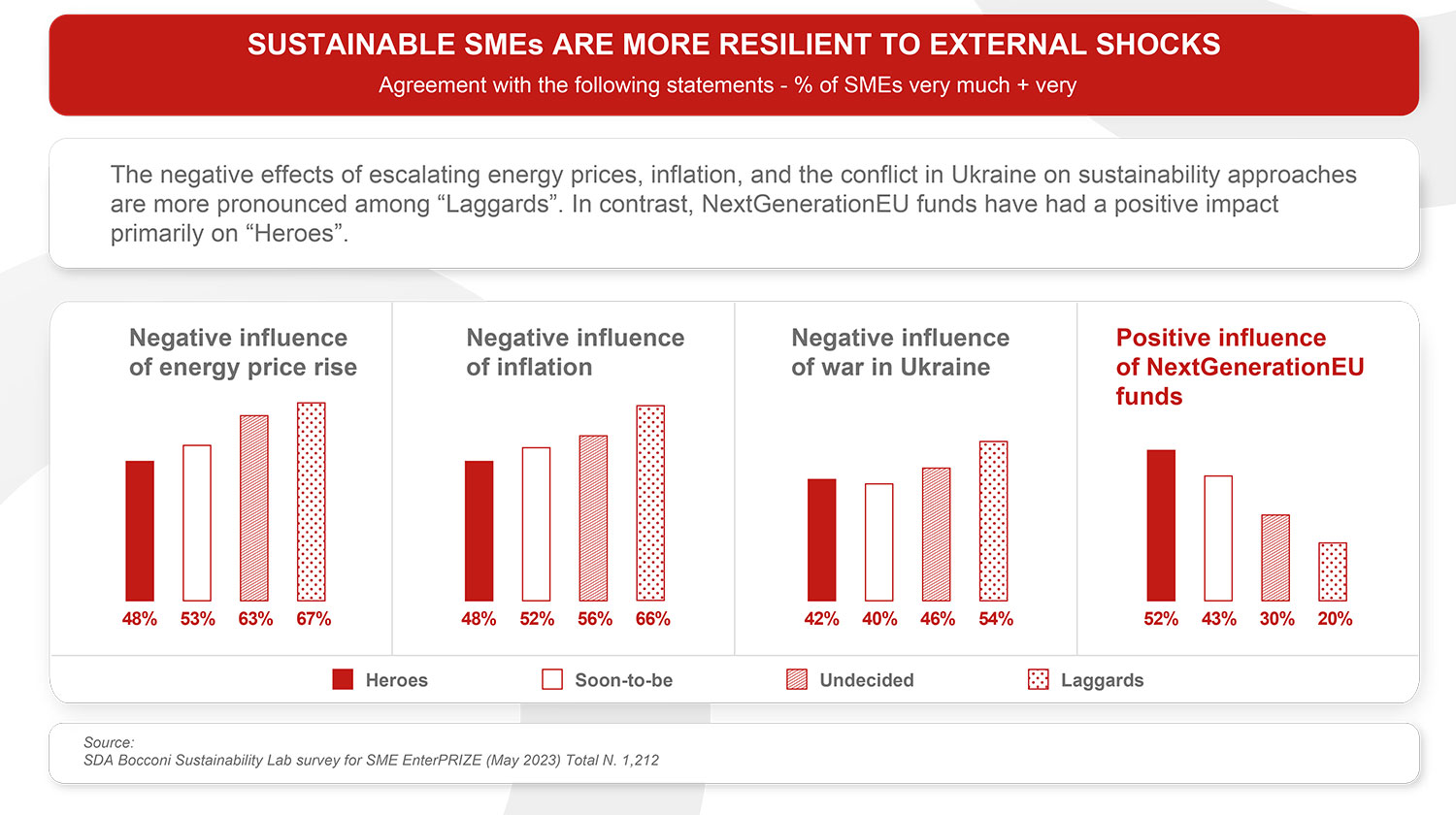
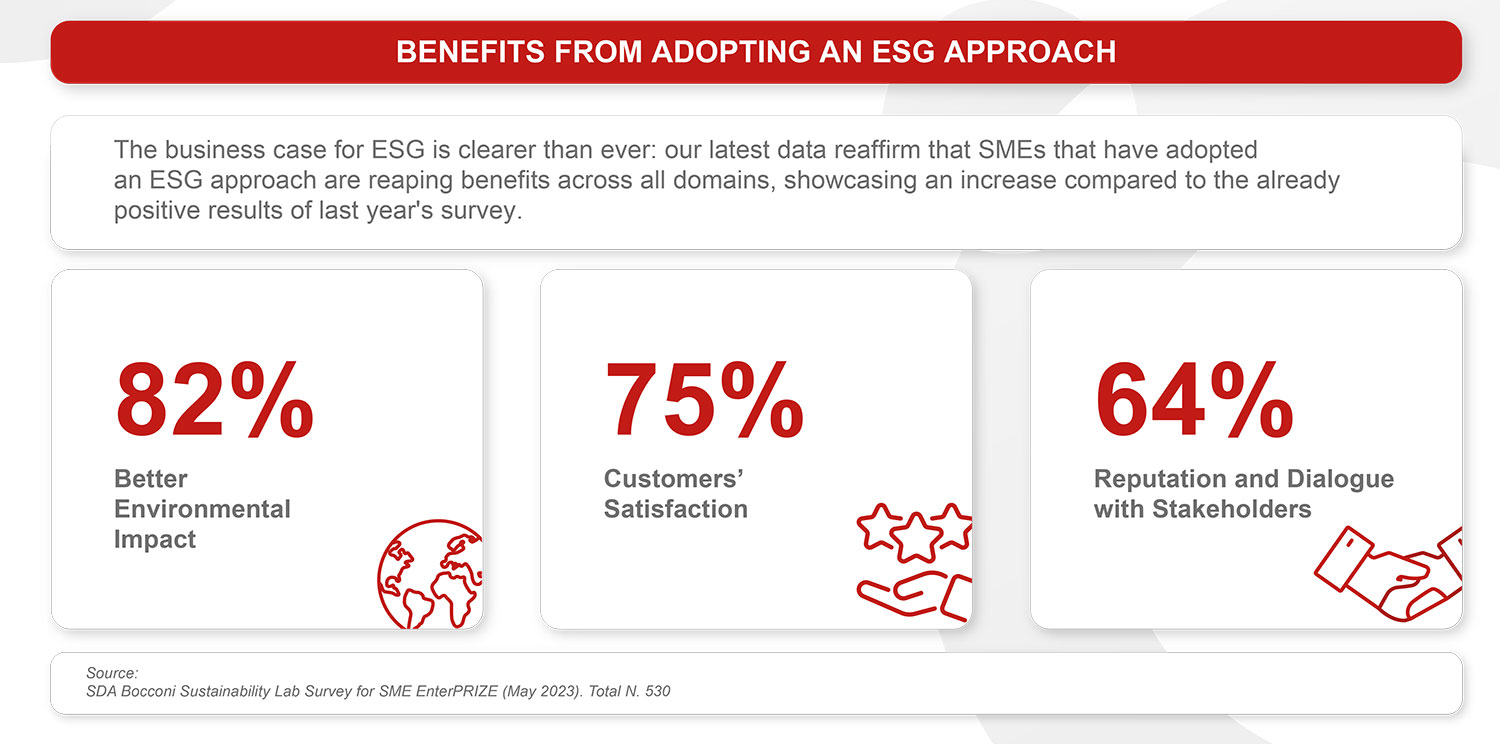
Generali Group General Manager, Marco Sesana, said: “SMEs play a central role as the true engine of our economy. It is clear that new challenges and barriers are risking SMEs efforts to become more sustainable. At the same time, SMEs are identifying where, and how, they can be supported to overcome these barriers – indicating a key role to play for Europe’s policymakers. The importance of the sustainable transition is also highlighted in this research: SMEs which have adopted sustainable practices benefit from an improved performance in key business results and gain greater resilience from external shocks. With the third edition of SME EnterPRIZE, Generali reaffirms its commitment to promoting a culture of sustainability among SMEs.”
“Despite the challenges faced by businesses in recent years, our latest research highlights the resilience of European SMEs when it comes to embracing a more structured approach to sustainability. Our findings reveal that 43% of the SMEs in our sample have either adopted or are in the process of adopting a formalized sustainability strategy. This represents a 3% increase compared to our previous investigation in 2022 and a 10% increase from a similar analysis conducted in 2020,” said Francesco Perrini, Associate Dean for Sustainability and Scientific Director of the Sustainability Lab at SDA Bocconi School of Management, Full Professor of Management at the “Management & Technology” Department at Bocconi University.
“What’s even more noteworthy is that the business case for environmental, social, and governance (ESG) practices is now clearer than ever. Our survey reaffirms that SMEs that have embraced an ESG approach are reaping benefits across all areas, surpassing the already positive results observed last year. For instance, 82% of the interviewed SMEs reported improvements in their environmental impact, while 74% noted enhanced operational efficiency. Additionally, 68% of the SMEs reported accessing new markets, indicating that sustainability credentials are increasingly crucial for SMEs seeking to enter and expand into new market segments.”
Snapshot of Europe’s SMEs – German and Italian companies lead the way
Over half of German (55%) and Italian (51%) interviewed SMEs stated that they already implemented a plan to foster their sustainable transition or were soon to introduce one. This was followed by Portugal (49%) and Austria (44%). The European average of 43 percent was mirrored in Spain. Falling below the average was France, Hungary, Czech Republic, and Croatia.
The country with the largest amount of companies with no sustainability plan in action yet was Czech Republic (46%), followed by Croatia (44%) and France and Spain (41%, respectively). The European average was 37 percent, which was also exceeded by Spain, and Hungary. Austria stood at 37 percent, while a smaller number of “laggards” were found in Germany, at just 30 percent, and Italy and Portugal at 33 percent.
Year-on-year, the number of SMEs planning to, or having already implemented a plan, rose by 2 percentage points (p.p.) across Europe. The largest increase year-on-year was seen in Italy, which rose by 14 p.p., followed by Germany, at 8 p.p., and Hungary at 4 p.p.. All other countries saw a decrease, with France, Czech Republic and Spain recording a 3 p.p. drop. As there was no 2022 data record for Croatia and Portugal, their data is compared to 2020. Portugal rose by 13 p.p. while Croatia decreased by 6 p.p.
The European average of SMEs with no sustainability plan dropped by 6 p.p. to reach 37 percent. The situation in Italy got significantly better with a 23 p.p. improvement; in Germany, the number of “laggards” fell by 8 p.p. year-on-year with decreases also seen in Hungary, Austria, and Czech Republic. Spain rose by 2 p.p., while France was stable. Both Croatia (+30 p.p.) and Portugal (+26 p.p.) increased significantly compared to 2020.
